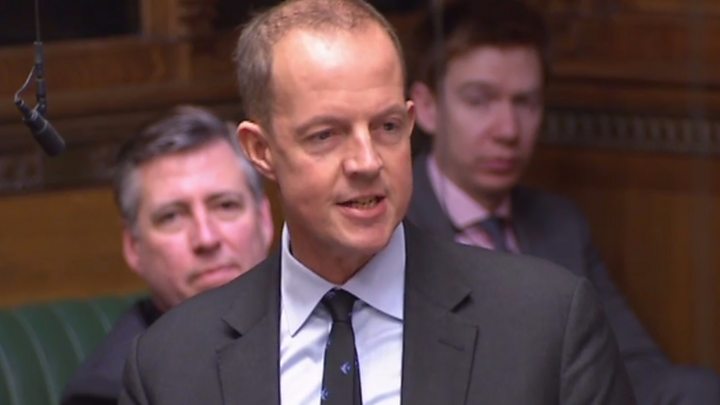Brexit votes: MPs fail to back proposals again
Media playback is unsupported on your device
MPs have again failed to agree on proposals for the next steps in the Brexit process.
The Commons voted on four motions for leaving the EU, including a customs union and a Norway-style arrangement – keeping the UK in the single market – but none gained a majority.
The votes were not legally binding, so the government would not have been forced to adopt the proposals.
The plan Theresa May negotiated with the EU has been rejected three times.
Mrs May now has until 12 April to either seek a longer extension from the EU to take a different course or decide to leave the EU without a deal.
She will meet her cabinet on Tuesday morning to discuss what to do next – as BBC political correspondent Vicky Young says.
The option defeated by the narrowest margin was a proposal for a customs union, losing by only three votes.
That would see the UK remain in the same system of tariffs – taxes – on goods as the rest of the EU – potentially simplifying the issue of the Northern Ireland border, but preventing the UK from striking independent trade deals with other countries.
The motion calling for a confirmatory referendum received the most votes in favour, totalling 280, but still lost by a margin of 12.
Following the failure of his own motion to stay in the Single Market – known as Common Market 2.0 – Nick Boles resigned from the Conservative Party.
In a point of order following the results, the MP for Grantham and Stamford said he could “no longer sit for this party”, adding: “I have done everything I can to find a compromise.”
As he left the Commons, MPs were heard shouting, “don’t go Nick”, and others applauded him.
He later tweeted that he would remain an MP and sit in the Commons as “an Independent Progressive Conservative”.

Media playback is unsupported on your device
Brexit Secretary Stephen Barclay said the “only option” left was to find a way forward that allows the UK to leave the EU with a deal.
“The government continues to believe that the best course of action is to do so as soon as possible,” he said.
“If the House is able to pass a deal this week it may still be possible to avoid holding European elections.”
Labour leader Jeremy Corbyn said it was “disappointing” that none of the proposals secured a majority, but he said he wanted to remind the Commons that Mrs May’s deal had been “overwhelmingly rejected”.
He added: “If it is good enough for the prime minister to have three chances at her deal, then I suggest it’s possible the House should have a chance to consider again the options we had before us… so the House can succeed where the prime minister has failed – in presenting a credible economic relationship with Europe for the future that prevents us crashing out with no deal.”
The results of the votes were:
- Motion C: Committing the government to negotiating “a permanent and comprehensive UK-wide customs union with the EU” as part of any Brexit deal – proposed by Tory former chancellor Ken Clarke
- Motion D: Referred to as Common Market 2.0, this option would mean joining the European Free Trade Association and European Economic Area – proposed by Mr Boles
- Motion E: This is for a confirmatory referendum, giving the public a vote to approve any Brexit deal passed by Parliament before it can be implemented – proposed by Labour MPs Peter Kyle and Phil Wilson
- Motion G: The motion aims to prevent the UK leaving without a deal, including a vote on whether to revoke Article 50 – stopping Brexit – if the EU does not agree to an extension – proposed by the SNP’s Joanna Cherry
Some MPs have criticised their colleagues for not agreeing on any of the options.
Health Secretary Matt Hancock said it was time for Mrs May’s deal to be passed.
Liberal Democrat Norman Lamb told BBC Look East he was “ashamed to be a member of this Parliament” and hit out at MPs in his own party – five of whom voted against a customs union and four of whom voted against Common Market 2.0.
He said the Commons was “playing with fire and will unleash dark forces unless we learn to compromise”.
But prominent Brexiteer Steve Baker told the BBC he was “glad the House of Commons has concluded nothing”.
He said the prime minister must now go back to the EU and persuade them to rewrite the withdrawal deal – something they have so far refused to do – otherwise the choice was between no deal or no Brexit.
Senior figures in the EU also showed their frustration at the results in Westminster.
European Parliament Brexit coordinator Guy Verhofstadt tweeted that by voting down the options, a “hard Brexit becomes nearly inevitable”.





